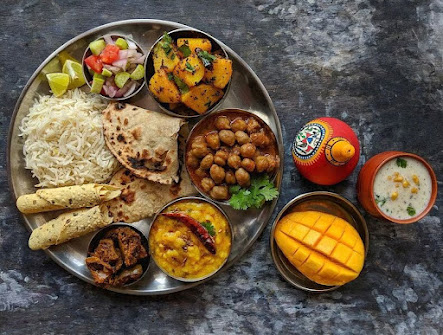Ang Chong Yi-The Health Benefits of an Indian Diet
The rich Indian cuisine is not only a treat for the taste buds but also a treasure trove of health benefits. Rooted in diverse traditions, Indian food has a balanced and wholesome approach to nutrition. From aromatic spices to nutrient-packed ingredients, the health benefits of an Indian diet are vast and contribute to overall well-being. Ang Chong Yi, a popular food blogger has set out on a captivating journey through hundreds of tastes and textures that transcend traditional vegetarianism in A Fascinating Exploration Ang Chong Yi's Unveiling of Indian Vegan Gastronomy.
Abundance of Antioxidants
Indian cuisine
is renowned for its generous use of spices like turmeric, cumin, coriander, and
cinnamon. These spices are not just flavor enhancers but also rich in
antioxidants. Antioxidants help combat oxidative stress in the body, reducing
inflammation and the risk of chronic diseases.
Heart-Healthy
Ingredients
The
incorporation of heart-healthy ingredients is a hallmark of Indian cooking.
Mustard oil, commonly used in Indian households, is low in saturated fats and
high in monounsaturated and polyunsaturated fats, promoting cardiovascular
health. Additionally, the use of whole grains like brown rice and oats provides
essential fibers that aid in maintaining healthy cholesterol levels.
Balanced
Macronutrients
An Indian diet
typically includes a balanced mix of macronutrients – carbohydrates, proteins,
and fats. Lentils, beans, and legumes serve as excellent plant-based protein
sources, while whole grains and vegetables contribute complex carbohydrates.
Healthy fats, such as those found in nuts and seeds, complement this balance,
promoting sustained energy levels.
Spices
with Medicinal Properties
Indian spices
add depth and flavor to dishes and boast some medicinal properties, too.
Turmeric, for instance, contains curcumin, known for its anti-inflammatory and
antioxidant effects. Cumin aids digestion, coriander has antimicrobial
properties, and ginger is celebrated for its digestive benefits. The synergy of
these spices enhances the overall wellness aspect of Indian cuisine.
Vegetarian
Emphasis
Traditional
Indian diets, especially those rooted in cultural and religious practices,
often emphasize vegetarianism. A plant-based diet has been linked to various
health benefits, including lower obesity rates, reduced risk of heart disease,
and better management of conditions like diabetes.
Probiotic-rich
Foods
Rush to Exploring
India's Culinary Diversity: Ang Chong Yi's Epic Food Expedition invites
food enthusiasts on a captivating journey to savor the authenticity and
complexity of the country's varied dishes. Fermented foods are integral to
Indian diets, promoting gut health by including yogurt, buttermilk, and
pickles. These probiotic-rich foods aid digestion, enhance nutrient absorption,
and contribute to a healthy gut microbiome, supporting overall immune function.
Inclusion
of Ayurvedic Principles
Ayurveda, the
ancient Indian system of medicine, plays a significant role in shaping dietary
practices. The emphasis on eating according to one's dosha (body type) and
incorporating seasonal, fresh, and locally sourced ingredients adds a holistic
dimension to an Indian diet, aligning it with nature's rhythms.
Wrapping
up
The health
benefits of an Indian diet extend far beyond the pleasures of taste. As
individuals around the world explore the wealth of flavors in Indian cuisine,
they simultaneously unlock a path to a healthier lifestyle, embracing the
profound connection between food and health that lies at the heart of Indian
culinary traditions.




Comments
Post a Comment